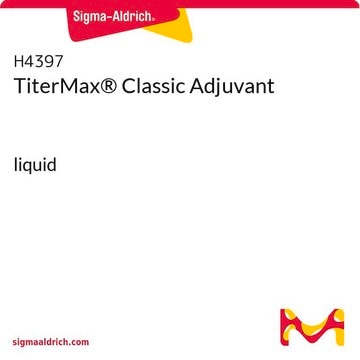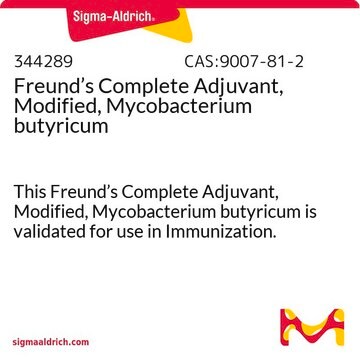T2684
TiterMax® Gold Adjuvant
liquid
Synonym(s):
TiterMax adjuvant
Sign Into View Organizational & Contract Pricing
All Photos(1)
About This Item
Recommended Products
General description
TiterMax Gold Adjuvant contains three essential ingredients: a new block copolymer, CRL-8300, squalene (a metabolizable oil) and a sorbitan monooleate.
Application
TiterMax® Gold Adjuvant has been used:
- to emulsify soluble antigen-1 (Ag-1) to immunize animals to generate fully human monoclonal antibodies from XenoMouse strains
- to inject GST-dGIPC (Drosophila homolog of GAIP interacting protein) protein into rats for generating antibodies against dGIPC protein
- with Drosophila CtBP (dCtBP) protein in phosphate-buffered saline (PBS) to subcutaneously inject in a New Zealand female rabbit
Biochem/physiol Actions
Specific proteins can be emulsified with equal volume of TiterMax® Gold Adjuvant to immunize lab animals and extract antibodies from them.
TiterMax Gold is a new and improved water-in-oil adjuvant. By developing a new block copolymer and eliminating the silica from the formulation, TiterMax Gold appears to be less toxic and more effective than TiterMax Classic. The optimum volume of TiterMax Gold for an emulsion is twice that of TiterMax Classic.
Legal Information
TiterMax is a registered trademark of TiterMax USA, Inc
Disclaimer
Unless otherwise stated in our catalog or other company documentation accompanying the product(s), our products are intended for research use only and are not to be used for any other purpose, which includes but is not limited to, unauthorized commercial uses, in vitro diagnostic uses, ex vivo or in vivo therapeutic uses or any type of consumption or application to humans or animals.
related product
Product No.
Description
Pricing
Storage Class Code
10 - Combustible liquids
WGK
WGK 3
Flash Point(F)
Not applicable
Flash Point(C)
Not applicable
Personal Protective Equipment
dust mask type N95 (US), Eyeshields, Gloves
Certificates of Analysis (COA)
Search for Certificates of Analysis (COA) by entering the products Lot/Batch Number. Lot and Batch Numbers can be found on a product’s label following the words ‘Lot’ or ‘Batch’.
Already Own This Product?
Find documentation for the products that you have recently purchased in the Document Library.
Customers Also Viewed
Seppo Parkkila et al.
BMC clinical pathology, 8, 2-2 (2008-02-20)
S100P is a Ca2+ binding protein overexpressed in a variety of cancers, and thus, has been considered a potential tumor biomarker. Very little has been studied about its normal expression and functions. We examined S100P expression in normal human tissues
Jihyun Kim et al.
Biochemical and biophysical research communications, 402(3), 565-570 (2010-10-30)
To identify genes that function in the adult neural system, we screened pools of P element-mediated mutants and tested locomotor activity of homozygous flies. Of 1014 P element-mutagenized lines, 638 were homozygous viable. These lines were tested for climbing ability
Fernando Garces et al.
Cell reports, 30(6), 1714-1723 (2020-02-13)
Calcitonin-gene-related peptide (CGRP) plays a key role in migraine pathophysiology. Aimovig (erenumab; erenumab-aooe in the United States) is the only US Food and Drug Administration (FDA)-approved monoclonal antibody (mAb) therapy against the CGRP receptor (CGRPR) for the prevention of migraine.
Elwira Pyz et al.
European journal of immunology, 38(4), 1157-1163 (2008-03-20)
Inhibitory receptors are required for the control of cellular activation and they play essential roles in regulating homeostasis and immunity. We previously identified a human inhibitory C-type lectin-like receptor, MICL (CLEC12A), a heavily glycosylated monomer predominantly expressed on myeloid cells.
Anand Srivastava et al.
PloS one, 6(5), e20270-e20270 (2011-06-01)
Var2CSA, a key molecule linked with pregnancy-associated malaria (PAM), causes sequestration of Plasmodium falciparum infected erythrocytes (PEs) in the placenta by adhesion to chondroitin sulfate A (CSA). Var2CSA possesses a 300 kDa extracellular region composed of six Duffy-binding like (DBL)
Our team of scientists has experience in all areas of research including Life Science, Material Science, Chemical Synthesis, Chromatography, Analytical and many others.
Contact Technical Service









